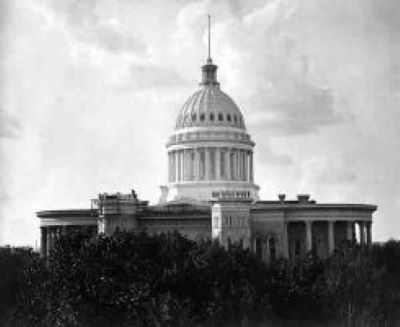“The well known Janesville lady lawyer read an interesting paper.”
Wisconsin State Journal, October 9, 1879
The American Women’s Association Congress was held in the state capitol building in Madison in October 1879. Seventy-five women from around the country attended.

The 1880 Annual Report of the Association for the Advancement of Women said:
Through the action of the local committee, the fine and spacious assembly room of the capitol was placed at our disposal, and the ladies of Madison decorated it with flowers and smilax, a rare innovation in a state capital.
Discussions are always limited to members. Among those who were always ready for the debate were Miss Goodell. In the words of the Wisconsin State Journal, “One of the most interesting features of the women’s congress is the discussion which follows the papers presented. The ladies take the floor readily, and speak with remarkable aptness, peace and beauty. Without ranting or staginess, in gentle but distinct tones, with a felicity of expression, and directness, rarely found, except in the best speakers. They certainly show themselves the peers of men in similar conventions.
Lavinia’s diary entry for Wednesday, October 8, 1879 reported: “Attended the Cong. all day and evening. A splendid time. Met lots of delightful people and the papers and speeches were good and audiences large and appreciative. Read my piece in evening. It is 11 P.M. and I am tired.
Although the full text of Lavinia’s paper has not survived, the Wisconsin State Journal gave the following account:
Miss Goodell said that punishment for crime was in early days lawless and irregular, and only in comparatively modern times had anything like system been established. There was then little distinction between civil and criminal offenses. The satisfaction of private wrong was succeeded by retributive justice, then followed a system of public justice. The lecturer instanced some of the many methods of evading the law, in the middle ages, and the crimes committed in the name of justice. The object of government was finally pronounced and established to be the protection of citizens in their proper avocations. It is not the province of government to establish retributive and penal justice. God alone is capable of dealing out perfect justice – to no set of men has he delegated the administration of retributive justice. A thousand ramifying and combined instances and forces have to be weighed, in dealing out exact justice; to do this thoroughly, is not in the power of mortal man.
In the system now in vogue in this country, three forces are brought to bear: 1st, the deterrent, by which the culprit is restrained by imprisonment; 2d, the correctional, in which reformatory teachings are introduced, and moral influences brought to bear; 3d, the preventive, in which suffering is inflicted both as a species of retribution and as a warning to others. The object of penal legislation being to protect society in its avocations, the question arises how these three methods can be administered, to secure the desired end of correcting the criminal disposition? Mankind is coming to learn that to either torture or kill will not produce the desired end. Miss Goodell claimed that, first, culprits should be put under the care of officers who are philanthropists, scientists and philosophers – the highest and the best moral talent of the day should be in charge of the development of the morals and intellect of criminals. By suitable treatment, culprits may become sober and correct citizens. Miss Goodell spoke at considerable length in favor of prison reform. She would have the prisons psychological hospitals, instituted for actual reform. She would not have the way of transgression less hard, but the path of reform easier to tread. She did not believe in pardons except where new evidence was found; pardons should come through the industry, economy and improved moral behavior of the culprit. Imprisonment should be but the retention of a dangerous class, and both the making them self-sustaining by industry, and the reforming of them.
To see the Wisconsin State Journal’s entire discussion of Lavinia’s paper and the ensuing discussion, click here. Other portions of the Congress and Lavinia’s participation in it will be covered in a future post. NK
Sources consulted: Annual Report of the Association for the Advancement of Women (1880); Wisconsin State Journal; Lavinia Goodell’s diaries.








“To see the Wisconsin State Journal’s entire discussion of Lavinia’s paper and the ensuing discussion click here.”
Link did not work properly